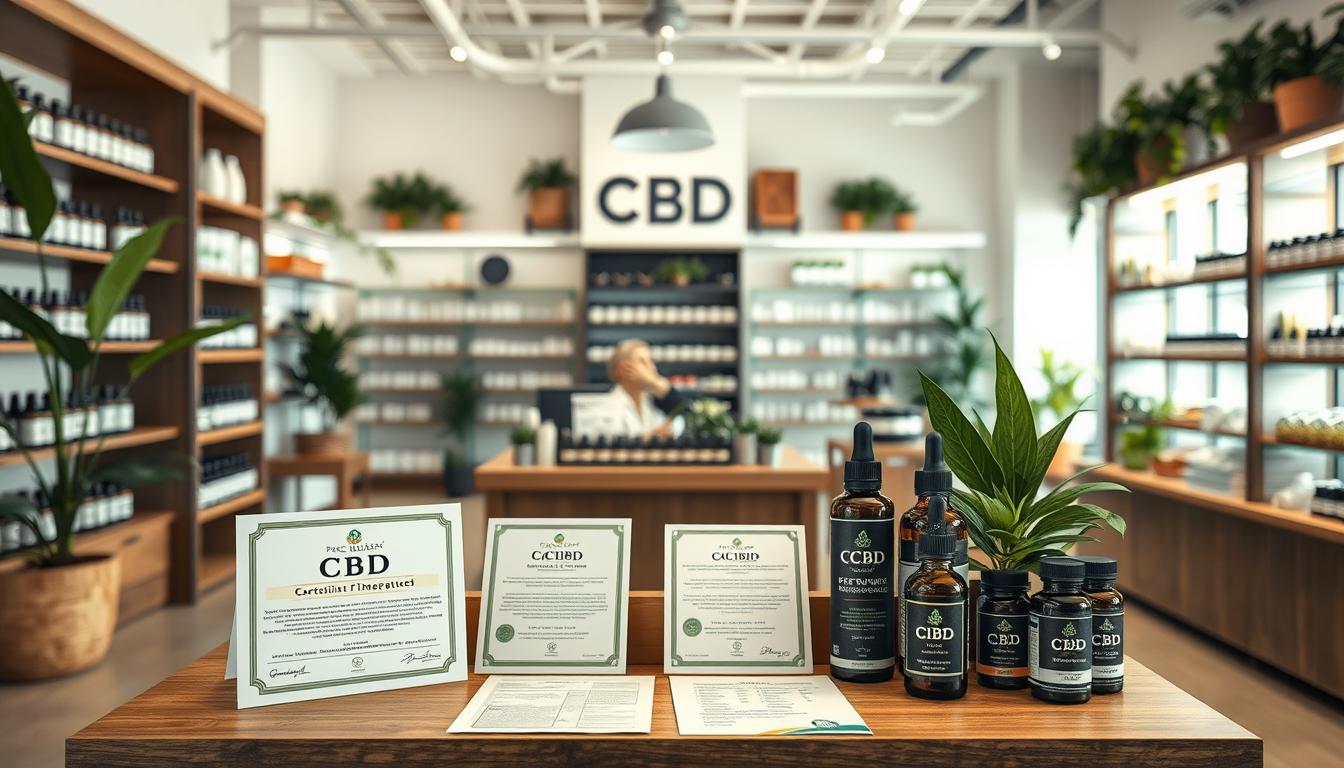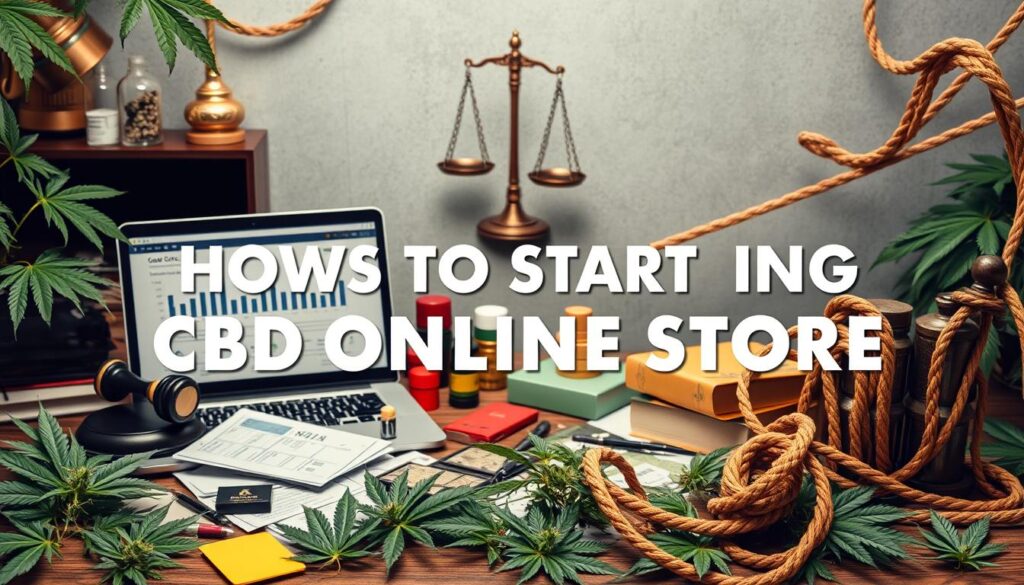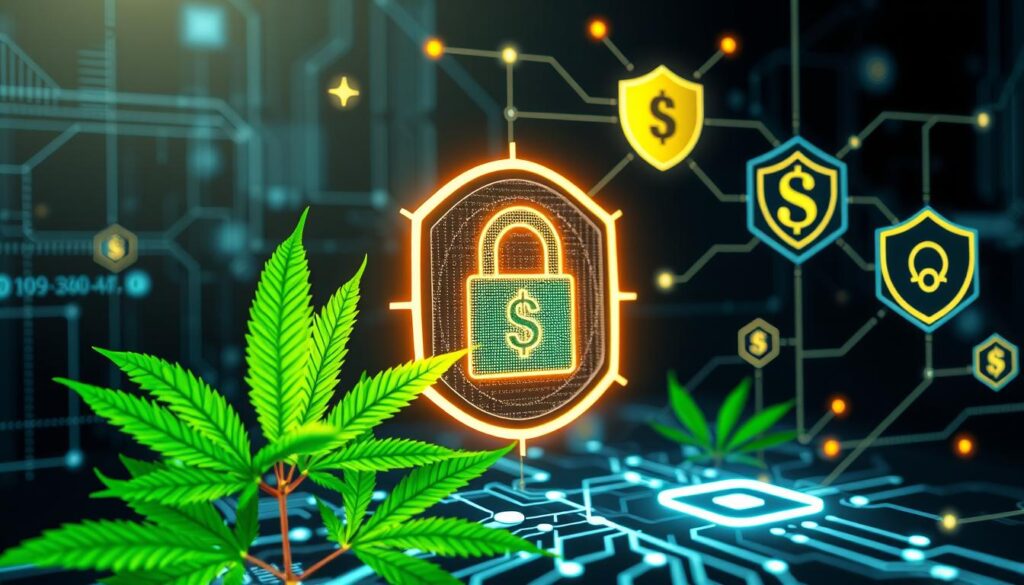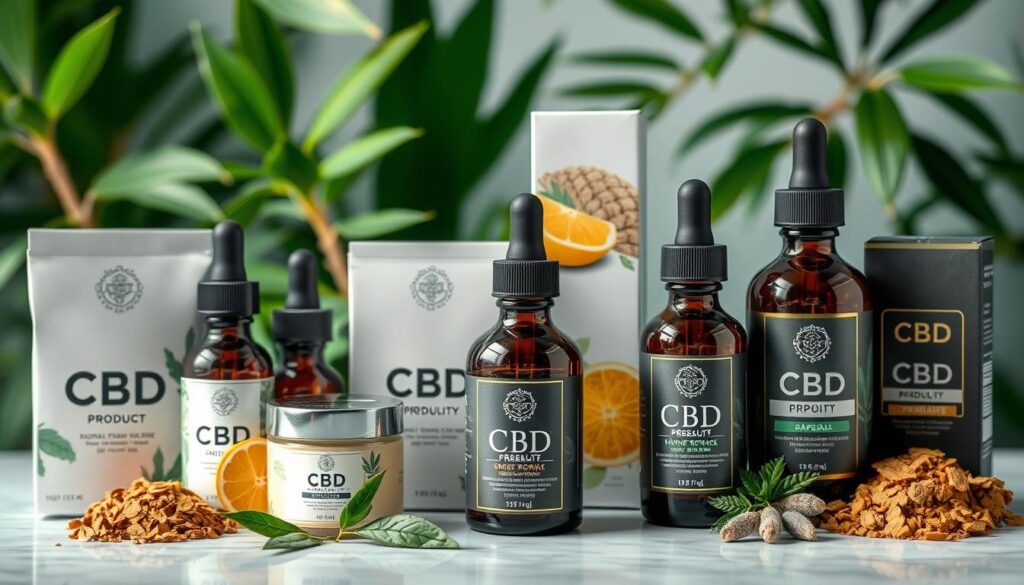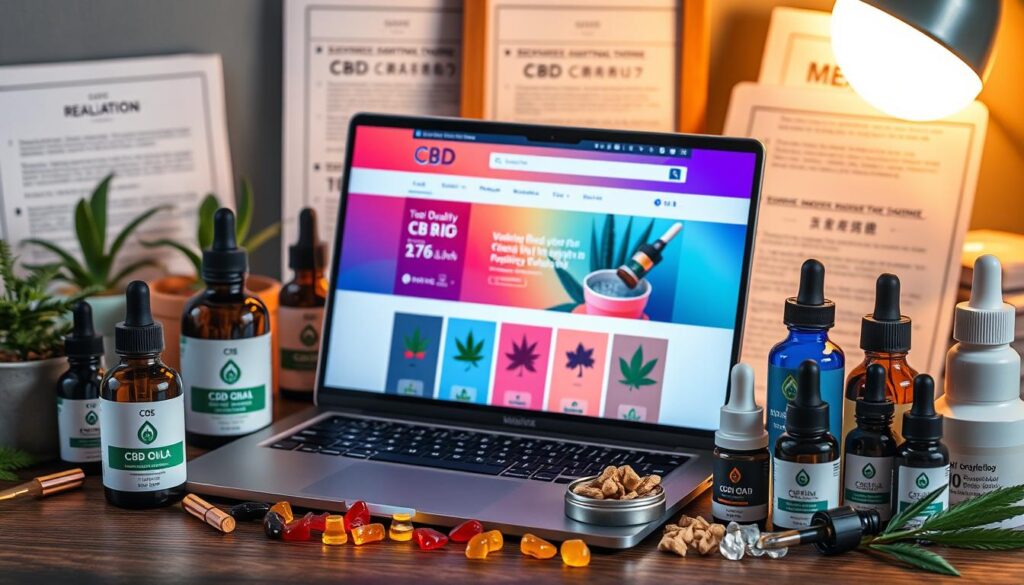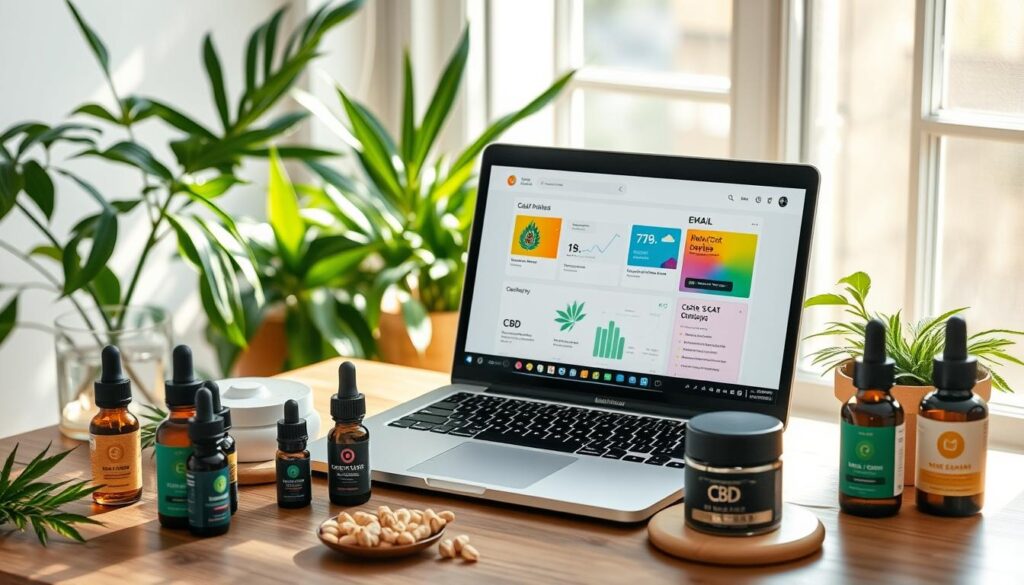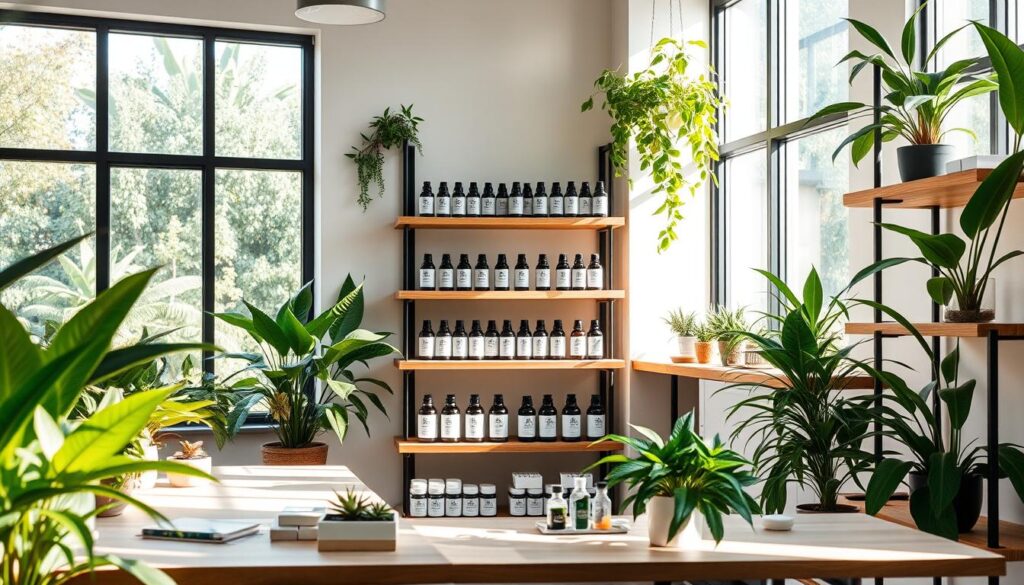In an industry where skepticism is common, how can you, as a CBD brand, stand out and earn trust?
The CBD market has faced many misconceptions and strict rules. It’s crucial for brands to show they are credible. Did you know 24% of CBD users don’t know CBD comes from hemp and cannabis? Also, 45% of people are confused about how CBD is made, showing the need for clear information.
Creating informative content can help clear up myths and make your brand trustworthy. With social media restrictions, cannabis content marketing is more important than ever. Educational content can help your brand connect with your audience.
Many brands have shown how to market CBD well. For example, Veritas Farms put QR codes on products for easy lab result access. CV Sciences has also entered mainstream stores, making more people trust CBD. These actions help build trust and make your brand stand out.
Surveys show 35% of people are more likely to buy from a known brand, and 37% are eager to try new products from trusted companies. So, building credibility is key for success. To boost trust, try in-store demos and clear product labels.
Building trust in the CBD market requires education, transparency, and creative marketing. By using these strategies, we can improve our brand and gain loyal customers.
Understanding the Importance of Transparency in CBD Sourcing
In the fast-growing CBD industry, being open about where hemp comes from is key. It’s about sharing where the hemp is grown and how it’s processed. It’s also about making sure people know what’s in the products they buy.
By explaining how CBD is made, labeling products right, and testing them, brands show they care about quality and safety. People want to know more about what they buy. This shows how important it is to keep high standards in making CBD.
Explaining the CBD Extraction Process
The way CBD is extracted affects its quality and purity. There are different methods, like CO2 extraction, ethanol extraction, and oil infusion. CO2 extraction is often the best because it makes a high-quality product without harmful stuff.
Being open about how CBD is made helps consumers understand the difference between hemp and marijuana. This is a big part of transparency in CBD sourcing.
Ensuring Product Labeling Accuracy
Clear labels are crucial for trust. Accurate labeling means giving detailed info about what’s in the product. This includes the type of cannabinoids, how much is in it, and any ingredients or allergens.
Every product should have a Certificate of Analysis (COA) from a trusted lab. This proves the product is safe and meets its claims. This openness helps keep customers safe and builds trust in the brand.
Using Third-Party Lab Testing for Verification
Third-party lab testing is key to proving a product’s quality. Labs check for harmful stuff like pesticides and heavy metals. This testing is a big deal for keeping customers safe.
Showing recent COAs on packaging or websites shows a brand’s commitment to quality. This builds trust with customers.
| Factors Verified by Third-Party Lab Testing | Importance |
|---|---|
| Potency | Ensures the product contains the advertised amount of CBD |
| Contaminants | Checks for pesticides, heavy metals, and other harmful substances |
| THC Levels | Confirms compliance with legal limits (less than 0.3% THC) |
| Cannabinoid Profile | Provides a detailed breakdown of all cannabinoids present |
By being open about where hemp comes from, using good extraction methods, labeling products right, and testing them, we can make people trust CBD more.
Leveraging Customer Reviews for CBD Products
In the competitive CBD market, using customer reviews can greatly help a brand. People look for real feedback before buying. This makes honest reviews key to building trust.
Importance of Authentic Customer Feedback
Real feedback is crucial for any CBD brand. 87% of people trust reviews from friends and family. Another 71% rely on influencers and bloggers. This shows how important genuine reviews are.
Good reviews help people feel sure about their choices. They show what others have experienced.
How to Gather Genuine Customer Reviews
To get real reviews, businesses need a smart plan. They should not pay for reviews to follow FTC rules. Using platforms like Yotpo helps get honest feedback.
For example, Medterra CBD got many more reviews after using Yotpo. These reviews can then be used to improve marketing.
Using Reviews to Enhance Brand Credibility
Showing reviews on your website and in ads can help your brand. Seeing others’ positive experiences makes people trust you more. Medterra CBD saw a big increase in sales thanks to reviews.
Also, having a good rewards program can keep customers happy and loyal. It shows the value of talking to customers.
| Benefit | Statistics |
|---|---|
| Content Marketing Utilization | 91% of businesses |
| Increase in Brand Awareness | 84% |
| Improved Credibility and Trust | 65% |
| Customer Trust in Customized Content | 78% |
| Trust in Objective Educational Content | 74% |
Quality Assurance and Certification for CBD Products
Ensuring product quality is key in the CBD market. With more CBD products available, like dietary supplements and oils, checking quality is crucial. To build trust, companies must follow strict quality checks. This includes getting Certificates of Analysis (COAs), following state testing rules, and getting organic CBD certification.
Obtaining COAs (Certificates of Analysis)
Getting COAs from trusted labs is vital for CBD quality. NSF International, with over 75 years of experience, works with QAI to certify hemp and CBD products. These certificates prove the product’s strength and purity, making it safe for consumers. They also help avoid risks from harmful substances like pesticides and heavy metals.
Understanding State-by-State Testing Standards
Rules for CBD products differ by state. Following these standards is important for staying legal. For example, hemp must have less than 0.3% THC. Testing for contaminants like heavy metals and pesticides on every tenth batch ensures safety.
Benefits of Organic CBD Certification
Getting organic CBD certification boosts trust in product quality. Since 2019, QAI has certified U.S.-grown hemp and products. Organic certification, checked by NSF and QAI, means no synthetic chemicals. It also shows a brand’s commitment to the environment and quality.
| Testing Standards | Description |
|---|---|
| COAs (Certificates of Analysis) | Ensures potency and purity, providing evidence of safety and quality. |
| State-by-State Testing Standards | Adherence to local regulatory requirements, including THC levels and contaminant testing. |
| Organic CBD Certification | Guarantees the use of sustainable, high-quality ingredients, bolstering consumer trust. |
Building CBD Customer Trust Through Education
Building trust in the CBD market starts with educating consumers. With the CBD market expected to hit $19.5 billion by 2025, teaching people about CBD is key. This education can turn occasional users into regular ones.
Being open about how CBD is made, the types available, and how to use it is crucial. Sharing this information helps clear up any confusion. It also builds trust. Using branded CBD content like articles and infographics is a great way to share this info.
About 26% of Americans tried CBD in 2019, and that number is expected to grow. This shows the need for educational content for all levels of users. By offering content for both newbies and experienced users, we can build a loyal customer base.
In the CBD market, being clear and open is essential. Showing third-party test results and using QR codes helps build trust. Brightfield’s data shows that transparent brands are more trusted, with 19% of the US market.
Online sales made up 38% of CBD sales in 2021. This highlights the importance of having clear and compliant online content. Brands need to make sure their online presence is trustworthy and informative.
Third-party testing is vital for proving product claims. However, only 16% of CBD products accurately list their contents. Ensuring products are tested and labeled correctly can greatly increase trust and safety.
Consumers should look for COA and dosing information when buying CBD. Teaching them to do this helps them make better choices. As the CBD market expands, educating consumers can help brands grow and keep customers loyal.
Establishing a Strong CBD Brand Reputation
In the competitive CBD industry, a strong brand reputation is crucial. CBD sales in the U.S. have grown from $535 million in 2018 to $7.8 billion in a year. This shows that people want reliable and trustworthy brands.
To stand out, we focus on quality. We get industry-recognized certifications like ISO 9001. Our facilities are also GMP 21 CFR Part 111 certified and FDA registered.
Becoming a thought leader is key to a strong brand. We create credible content about CBD and its benefits. This makes our brand an authority in the market.
Our content marketing focuses on education, not just promotion. This attracts consumers who value expertise and reliability. It boosts our standing and reaches more potential customers.
Effective Content Marketing Strategies
We make informative blog posts, videos, and guides. This valuable content drives traffic to our site and improves our reputation. Partnering with trusted e-commerce platforms and using real customer testimonials also builds trust.
A large number of consumers rely on these indicators when buying. Showing high BBB ratings on our site is essential.
Engaging with Cannabis Influencer Marketing
Cannabis influencer marketing is another powerful tool. Working with respected voices in the cannabis world amplifies our message. Influencers offer credible endorsements that connect with their audience.
Since 60% of American adults have tried CBD, influencer partnerships can greatly increase our reach. This helps us connect with potential customers on a personal level.
A strong CBD brand reputation is built on quality, trust, and expertise. By leading, using effective content marketing, and working with influencers, we build a loyal consumer base. They trust our brand and value our commitment to excellence.
